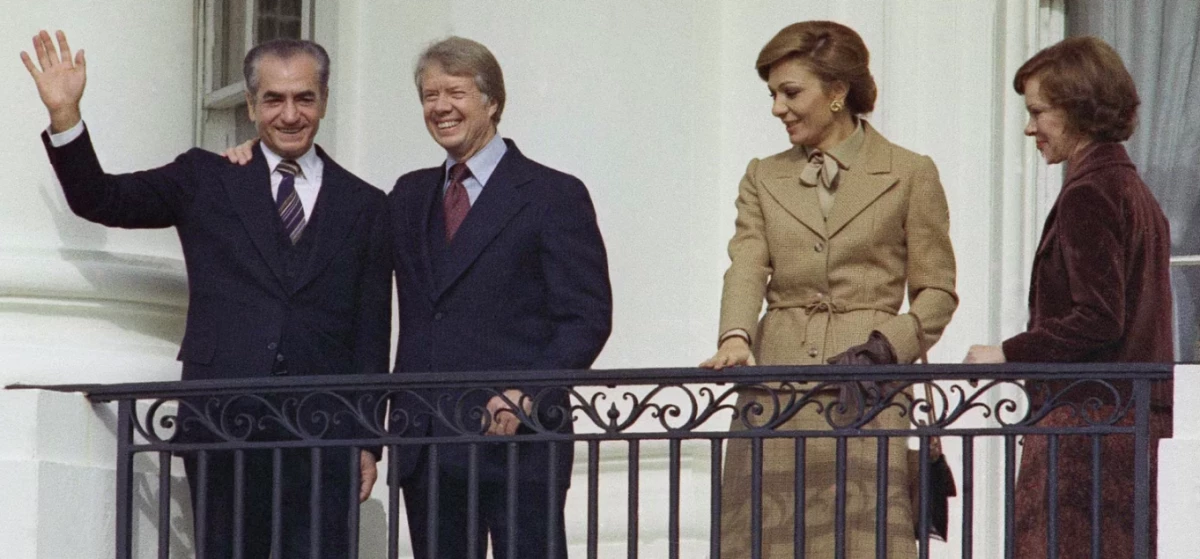Iranians react to Jimmy Carter's death with much criticism, little praise

FILE - The Shah of Iran, Mohammad Reza Pahlavi, President Jimmy Carter, Empress Farah Pahlavi and U.S. first lady Rosalynn Carter are pictured on a balcony at the White House in Washington, Nov. 15, 1977.
Iranians opposed to their nation's Islamist rulers who seized
power during the U.S. presidency of Jimmy Carter have reacted to his death at
age 100 with a wave of criticism about his enduring impact on Iran and some
supportive views of his post-presidential activities.
On the Monday edition of VOA Persian's "On the Line"
live audience call-in show, all 12 audience members whose phone calls, video
and voice messages were featured in the program criticized Carter, accusing him
of enabling the Islamic Republic's first supreme leader, Ayatollah Ruhollah
Khomeini, to seize power in 1979.
Eleven of the 12 audience members who commented for the
Persian-language show were calling from Iran, while the other audience member
was in the U.S.
Khomeini and his radical Shiite followers toppled the monarchy
of Iran's U.S.-backed shah, Mohammad Reza Pahlavi, on Feb. 11, 1979.
Pahlavi had fled into exile the previous month and arrived in
the United States on Oct. 22, 1979, for cancer treatment that Carter approved.
Islamist militants angry with the U.S. for harboring the
deposed shah stormed the U.S. Embassy in Tehran on Nov. 4, 1979, taking 66
Americans hostage.
Thirteen were released weeks later but the remaining 53
Americans were held through the rest of Carter's presidency. Iran freed them
after 444 days, upon the Jan. 20, 1981, inauguration of Carter's successor,
Ronald Reagan.
The Iranian callers to the VOA Persian show unanimously
expressed the view that Carter betrayed the shah by abandoning him as he faced
a growing Islamist rebellion and not doing enough to stop Iran from being
plunged into a dark era with its people enduring hardship under 45 years of
authoritarian Islamist rule.
After leaving office, Carter said he tried to balance
strategic and humanitarian considerations in his relationship with and
treatment of the shah.
Prominent U.S.-based Iranian supporters of Iran's exiled crown
prince Reza Pahlavi, the son of the deposed shah, also used the X platform to
post sharply critical views of Carter's legacy.
Journalist Behnam Amini wrote in Persian: "The man
responsible for the misery of the Iranian nation has died. Soon, the downfall
of the regime that he nurtured will come as well."
Also writing in Persian, monarchist Saman Sarraf described
Carter as the "founder of the Islamic Republic" and said: "With
Carter's death, the Islamic regime is on the brink of collapse."
Reza Pahlavi and his mother, exiled queen Farah Pahlavi, have
been silent on Carter's death. The exiled crown prince's office did not
immediately respond to a VOA request for comment sent Friday.
The National Iranian American Council (NIAC), a U.S. nonprofit
critical of the Pahlavi dynasty, with a mission to "advance peace and
diplomacy, secure equitable immigration policies and protect the civil rights
of all Americans," sent VOA a different view of Carter's role in Iran's
Islamic Revolution.
In a Friday statement, NIAC President Jamal Abdi said,
"It is important to understand that the 1979 [Islamic] Revolution was made
and led by Iranians, not by the United States. In fact, U.S. support for the
shah, despite his brutality toward protesters and torture of political
opponents, was one of the triggers for popular protest."
Abdi also wrote that members of the Iranian American community
admire Carter's efforts after his presidency to advance Middle East peace and
to warn about the direction of the Arab-Israeli conflict.
"President Carter's legacy is multi-layered and complex,
and not one that neatly fits the worldviews of his most animated
detractors," Abdi wrote.
Exiled Iranian journalist Akbar Ganji, also a critic of the
Pahlavi dynasty, offered praise for Carter in a Persian-language post on X,
calling him a "lifelong advocate for human rights around the world"
in his post-presidency activities.
Want to send us a story? SMS to 25170 or WhatsApp 0743570000 or Submit on Citizen Digital or email wananchi@royalmedia.co.ke
Comments
No comments yet.


Leave a Comment